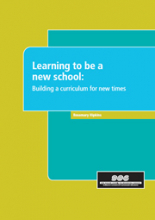NZCER's Professional learning work
You are here
Professional learning
Recent Professional learning research publications
A 2020 report prepared for the Ministry of Education.
This is the third evaluation report of the Teach First NZ programme. Teach First is a pilot, field-based initial education programme run in partnership between Teach First NZ and the University of Auckland.
The report is available here.
This report comes from an exploratory project looking at professional learning and development for primary science teachers.
Explores the role of vocational thresholds in capability development for general practice medicine, carpentry, and engineering technician work and how it can apply to learning in any field.
This report is the second annual evaluation report for the Teach First NZ pilot programme.
How do people learn to become general practitioners, carpenters and engineering technicians? This report is based on the Knowing Practice project and explores practice-based learning and capability building across three different fields. It is co-published by NZCER and Ako Aotearoa.
This is a summary of a presentation given at the NZCER's future-oriented science education conference in October. Rosemary Hipkins and Chris Joyce draw on a number of resources to showcase some of the science education work going on to support schools around the country.
This is a presentation on science PLD, given by Sabina Cleary of the University of Canterbury at the Building future-oriented science education in Aotearoa New Zealand conference in October 2014.
This was the keynote presentation given by NZCER senior researcher Ally Bull at the NZCER conference, Building future-oriented science education in Aotearoa New Zealand, held in Wellington on 21 October 2014.
This new free "rapid prototype" resource will be of particular use in school staff professional development workshops, and can also be used or adapted for use with students, parents, school Boards of Trustees, and anyone with an interest in what and how young people learn, and how education could be organised in the future. It invites groups to explore their current thinking and to imagine alternatives that provoke new questions about knowledge, and the roles, relationships, and structures that are needed to support future-oriented learning.
This paper explores the issues around professional learning and development (PLD) for science and makes suggestions for a rethink of PLD approaches to science in primary schools.
This article has been published in the journal Teachers and Teaching, Theory and Practice later this year. It reports on the factors that continued to sustain the initial commitment of a group of 57 primary and secondary teachers who had been identified early in their careers as individuals showing “promise” and who were predicted to make a significant contribution to teaching.
It’s a big deal to become an apprentice. You’ve decided you’d like to get trade qualified and your boss thinks you’re worth the time and effort. That’s why they signed you into a training agreement. While on the surface things might seem a little overwhelming, it’s not out of control. In fact it’s really under your control. So now is a good time for you to take charge of your apprenticeship because let’s face it – it’s your apprenticeship, your qualification and your career!
Albany Senior High School (ASHS) is a new senior secondary school intent on developing a curriculum for the 21st century. At the end of 2009 and 2010, its first two years of existence, it surveyed students on the learning approaches at the school. In this report, NZCER analysed the responses.
This report documents the beginnings of a new senior secondary school, set up with the aim of doing things differently for the 21st century. It discusses four key aspects of curriculum innovation at the school and explores its approach to learning and problem-solving through the lens of complexity theory.













